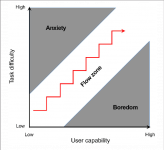This seems like a contradiction. If you’re able to to create an advantage from exploration, then the fights can’t be balanced. Maybe they were before, but the advantage negates it. That’s what it means to have an advantage. If you just rebalance the fight, then the exploration was never meaningful. It’s just a façade of exploration.
I suppose you could build those advantages into the design of the content. That seems to be what Age of Ashes has done (based on accounts here). However, not having those advantages seems to be rather punishing. I also wouldn’t consider Age of Ashes an exploration-based adventure given that the driving force is the story (rather than the impetus to explore).
The main thrust of my point was that exploration doesn't hinge on your ability to negate fights through the environment, it hinges on exploring. A situation where you can explore heavily, and even choose what fights you have to do (or choose to do less fights) using the paths you find, but where the encounter budgets of those fights is individually rigid, isn't in inherently conflict with an exploration-centric experience. It can mean accomplishing overall objectives in different ways, and facing different challenges without any of those challenges having to be overwhelmingly hard or trivially easy.
It can be learning about world around you, not in a way that simply translates to a victory in a fight (although applicable information is important) but as a major facet of the overall story of the campaign-- part of the fun of delving ancient ruins is learning about the people who lived there and what happened to them, and the secrets they hold, so if there are answers you simply won't get without putting in the effort to find them, that's a reward in its own right.
It's also a matter of degree, if you thoroughly explore your environment, you might find extra treasure that can make fights easier indirectly. You might be able to affect fights with the environment, but only in limited ways-- from experience I can tell you the encounter balance is robust, a severe fight that you can knock down to a moderate fight is certainly easier, but both are balanced encounters, they're just different amounts of resistance and risk-- part of the challenge might even just be not facing too many encounters at full blast so that you don't run dry on resources.
I think in your mental framework, you're doing the the equivalent of reducing balanced to a 5 on a 10 point scale, and then imagining environmental advantages as dropping it to like a 1, or significant enough screw-ups as increasing it to a 10, but in my mental framework, and encounter can start anywhere from 3/4 to a 6/7 and then bounce throughout that range based on my players actions, knowledge, treasure, dungeon interactions and so forth. The balance is still gamist-- you aren't say, separating a squad of enemies so completely you can truly pick them off one by one so they aren't a threat to you, but hey maybe you can find a means of getting rid of a monster or two, bumping the encounter the budget down to a lower (but still defined in the game rules) tier of difficulty.
Edit: To make another point that I neglected-- problem-solving also doesn't have to be about fights, imagine you party are currently interfering in elven politics, and the party. decide to head into a dungeon to stop attacks on a certain political figures holding and let them move against their rivals.
Thoroughly searching the area and finding the hidden chamber deep in the dungeon in which is stored the crown of the elves, which grants the holder magical authority over the dragons who once made a pact with the ancient elven king and are sleeping throughout elven lands, probably gives the party more options for dealing with that political situation. When the same party who doesn't explore as diligently might not uncover it, but still puts a stop to the source of the source of the attacks on the political figure, they continue on influencing politics through other means.
That's a massive influence exploration could have if they engage in, and succeed at it, without affecting the difficulty of fights at all.




